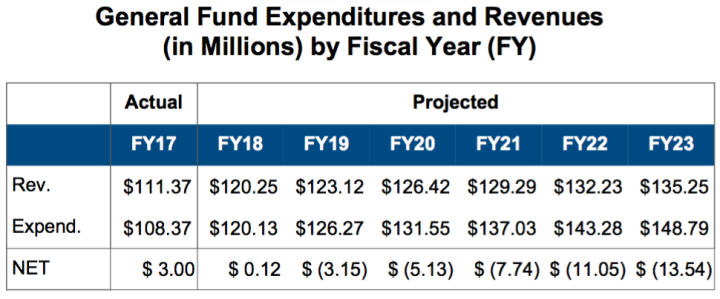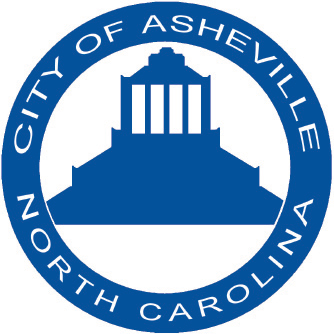With city expenditures projected to outstrip revenues over the next few years, Asheville is looking to plug a $3.2 million gap to balance its fiscal year 2018-2019 budget.
In the second part of its March 20 work session, which was front-loaded with the news that longtime City Manager Gary Jackson was being removed from his position, Asheville City Council heard a presentation from Chief Financial Officer Barbara Whitehorn about the status of the FY 2018-19 budget.
Whitehorn said the city has been able in previous years to balance its budget despite being stuck in a constant catchup cycle — regularly cutting expenditures to match revenues. She showed Council a forecast that demonstrated how the gap between funds coming in and money going out is expected to widen over the next five years. “I don’t think these are numbers that should alarm anyone in the long term,” she reassured Council. “This is a very normal city thing, and it’s a little bit more accentuated in Asheville because we have more limited revenue streams than some other cities.”

Asheville has seen a three percent increase in property tax revenues — which Whitehorn said comes from actual growth, not revaluation — a six percent increase in revenues from sales and other taxes and a 10 percent decrease in revenue from licenses and permits, which Whitehorn said is caused by permit revenue leveling off. “We had some major, major projects that brought in tremendous amounts of money with big fees, but you reach a tipping point where you can’t continue to have the big projects, but we’re still seeing growth,” she said.
Before factoring in about $2.7 million in cuts that have been identified by city staff, which come in part from one-time savings and cuts identified in specific departments after analyzing spending trends, Whitehorn said Asheville has a gap of about $5.8 million.
Some of the projected FY18-19 expenditures that caused the budget to grow include restoring one-time reductions that were made to balance previous budgets, a full year of expenses for the new downtown policing unit added in the middle of the previous year, an increased contribution by the city to employee health insurance, and added benefits for law enforcement to retain officers that are trained in Asheville.
The city will need to budget enough money for employee salaries, Whitehorn said, to ensure that the city remains an “employer of choice.” “We’ve resolved many of the issues we had,” Whitehorn said, “but we did for several years have significant turnover in a number of departments as the economy got better and suddenly we couldn’t compete with private employers anymore.”
Vice Mayor Gwen Wisler added that the shortfall Council was looking at didn’t include any of the enhancements Council members suggested during their Feb. 15-16 planning retreat. “$3.2 (million) is not the end of the story,” she said.
Council member Keith Young also pointed out that the budget could have an impact on the additional policing policies Council considered during the first part of the work session, which include co-funding an outside legal position with the county and enhancing the city’s equity and inclusion department.
Council members also asked Whitehorn about the city’s fund balance, a portion of the city’s revenue held in reserve for unanticipated expenses or revenue shortfalls. As a policy, she said, the city keeps its fund balance at or above 15 percent. Whitehorn estimated that the fund balance, which Wisler said is calculated based on city operating expenditures, is at about 16.5 percent. Whitehorn warned that spending a varying amount from the fund balance every year could have an impact on the rating given by agencies like Standard & Poor’s and Moody’s, both of which recently gave the city triple A ratings.
“The challenge is not to have [the fund balance] go 16, 17, 15; 16, 17, 15,” Whitehorn said. “They just kind of see that as you’re funding your operations with your one-time money …. That really says you’re not aligning your revenue with your expenditures. You’re just hoping your savings account will cover it.”
Whitehorn acknowledged that $3.2 million seems like a large number to people who wouldn’t see that amount of money in a single year, but said that the quantity is relatively small in the context of the city budget, which she estimated at $175 million to $180 million.
“This is our hurdle this year,” Whitehorn said.
Although dates will likely change based on the availability of Council members, City Council hopes to hold another budget work session on April 10, before making final decisions for the proposed budget on April 20. The proposed budget is scheduled for presentation at a Council meeting on May 15, followed by a public hearing on May 22. The budget is scheduled to be adopted at a Council meeting on June 12. The new budget will go into effect on July 1.



I’m doing my part to help the city cover this gap—our property taxes went up almost exactly $1,000 in the recent re-evaluation. So much for no net increase